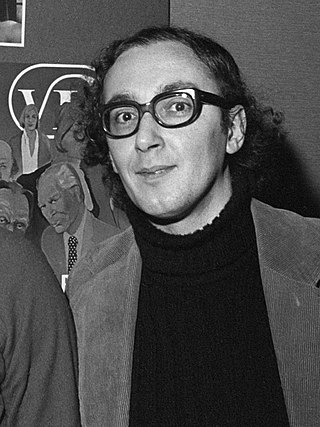Indo-Surinamese, Indian-Surinamese or Hindustani Surinamese are people of Indian origin who are nationals of Suriname with ancestry from India and the wider subcontinent. Their ancestors were Indian indentured workers brought by the Dutch and the British to the (then) Dutch colony of Suriname during the mid-19th to the early 20th century. Per the 2012 Census of Suriname, 148,443 citizens of Suriname are of Indo-Surinamese origin, constituting 27.4% of the total population, making them the largest ethnic group in Suriname on an individual level.

Willy Geertje van Ammelrooij, known as Willeke van Ammelrooy, is a Dutch actress and director.

Ciske de Rat is the first part of a trilogy by Dutch author Piet Bakker. It is part of the Ciske trilogy which was written between 1941 and 1946. The book was published in more than ten countries. It was made into two films, a television series and a musical. Best known is the film version of 1984, starring Danny de Munk as Ciske, Herman van Veen and Willeke van Ammelrooy.
Mira is a 1971 Dutch-Belgian drama film directed by Fons Rademakers, based on the novel De Teleurgang van den Waterhoek by Stijn Streuvels. It was entered into the 1971 Cannes Film Festival. The film was selected as the Dutch entry for the Best Foreign Language Film at the 44th Academy Awards, but was not accepted as a nominee. The film was one of the highest-grossing Dutch films of 1971 with a gross of $1.3 million from Belgium and the Netherlands.

Mijn nachten met Susan, Olga, Albert, Julie, Piet & Sandra is a 1975 Dutch erotic thriller film produced by Wim Verstappen, directed by Pim de la Parra and starring Willeke van Ammelrooy.
De Mantel der Liefde is a 1978 Dutch satirical anthology film, directed by Adriaan Ditvoorst. It is a black comedy based on the Ten Commandments and mankind's failure to live up to them.

Grijpstra & De Gier is a 1979 Dutch crime film directed by Wim Verstappen. It is based on the eponymous novel series by Jan Willem van de Wetering, specifically Het lijk in de Haarlemmer Houttuinen.

Bride Flight is a 2008 romantic drama film about three women and one man from the Netherlands, who all start new lives in New Zealand. It starts with the victory of the KLM flight in the 1953 London to Christchurch air race. It was directed by Ben Sombogaart and stars Rutger Hauer, Elise Schaap, Anna Drijver, Karina Smulders and Waldemar Torenstra. The Dutch singer Ilse DeLange wrote and sang the title song for the movie: "Miracle".
Help! The Doctor Is Drowning is a 1974 Dutch comedy film directed by Nikolai van der Heyde. It was the most popular Dutch film of the year and one of the most popular of all time.
Mia Van Roy is a Flemish film and television actress.

Netherlands–Suriname relations refers to the current and historical relations between the Netherlands and Suriname. Both nations share historic ties and a common language (Dutch) and are members of the Dutch Language Union.

Borger Breeveld is a Surinamese actor and journalist. He is the media manager at the Surinam Television Foundation (STVS) and founder of Film Institute Paramaribo.

Pim de la Parra is a Surinamese-Dutch film director.

De Fred Haché Show is a 1971 Dutch television show written and directed for the VPRO by Wim T. Schippers, Ruud van Hemert, Wim van der Linden, and Gied Jaspars. The show marked the return to television for Schippers, van der Linden, and Jaspars, who had been on the team that was responsible for the controversial 1967 show Hoepla, canceled after three episodes. Like its "sister show" Barend is weer bezig (1972-1973) and Van Oekel's Discohoek, it was an absurdist show with much nudity, linguistic humor, satirical skits, and illogical plot lines.

Emile Linus Alfred Wijntuin was a Surinamese politician who served as Chairman of the National Assembly of Suriname from 1975 until the aftermath of the 1980 Surinamese coup d'état. Wijntuin was a member of the Progressive Surinamese People's Party (PSV).

Gerard Spong is a Dutch lawyer of Surinamese descent.
The Progressive Surinamese People's Party was a political party in Suriname. The party was a member of the Christian Democrat Organization of America.

Milaisa Breeveld, known professionally as A Mili, is a Surinamese singer. She has had two chart hits in Suriname: "Omin lobi" (2014) and "Blindfolded" (2015). She won the first prize at the Open Podium Twente in 2018; later that year, she also received the Paul Smits Award, a public prize of the Popronde Amsterdam festival. During the Eurovision Song Contest 2021, she performed onstage as part of Jeangu Macrooy's rendition of "Birth of a New Age".
Clarence Breeveld was a Surinamese-born Dutch singer, guitarist and educator.

The Cinema of Suriname is part of the Surinamese culture. National cinema, as a kind of artistic creativity, was born in the second half of the 70s of the 20th century.













